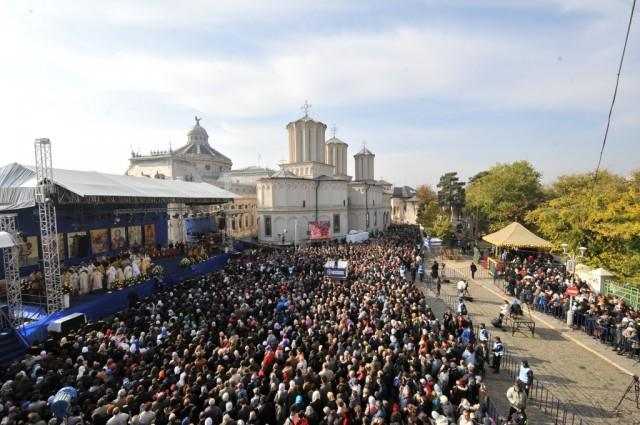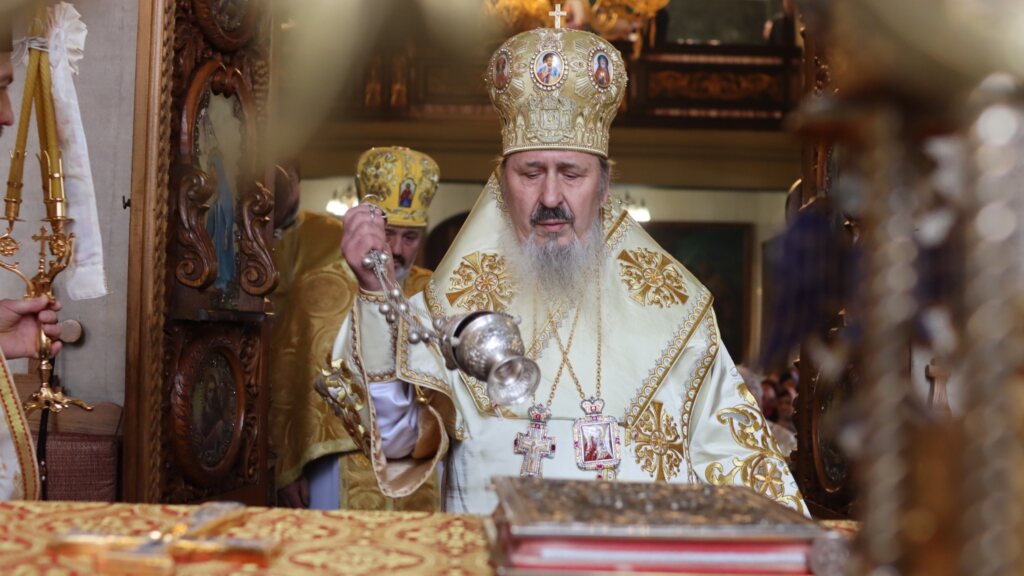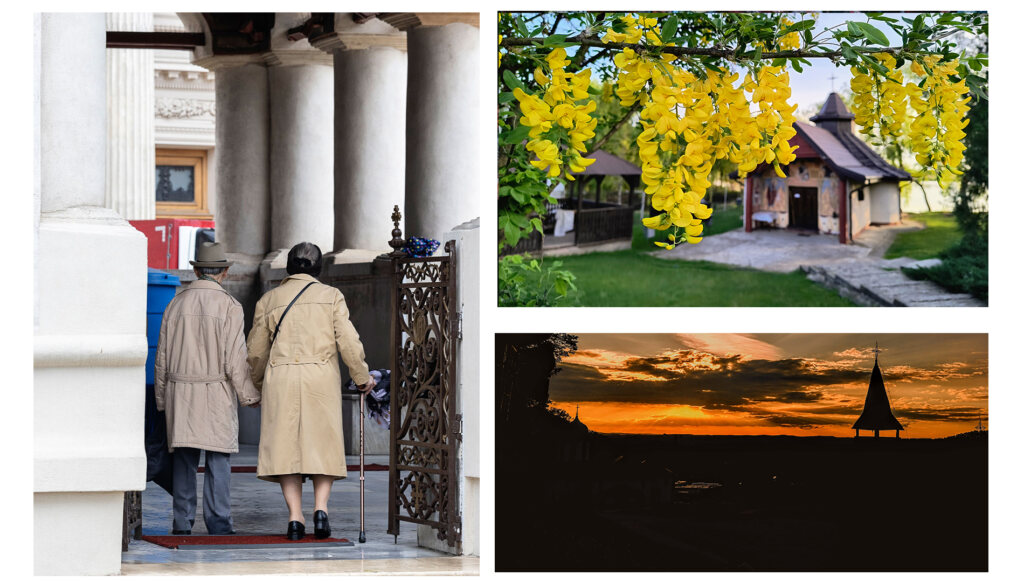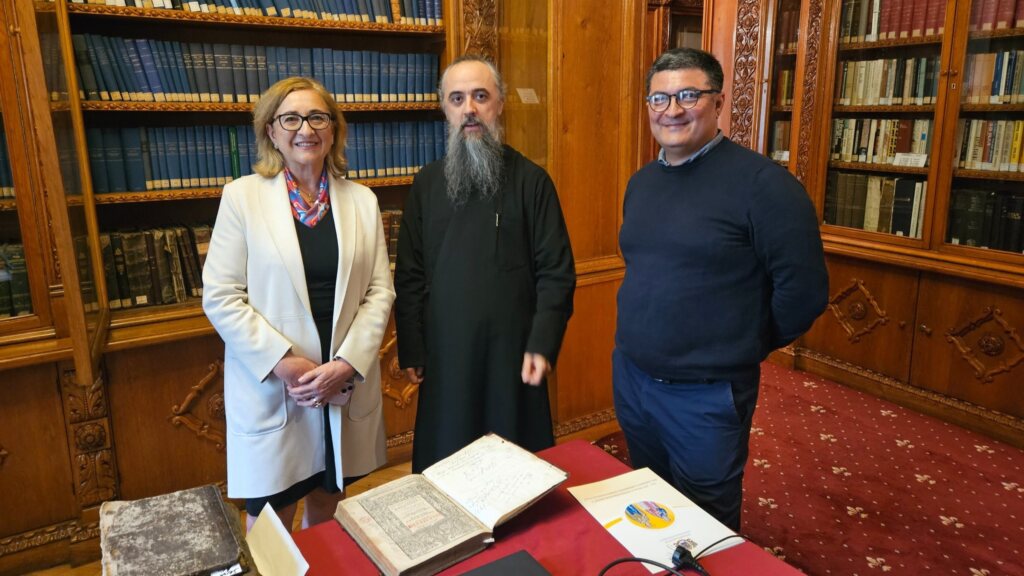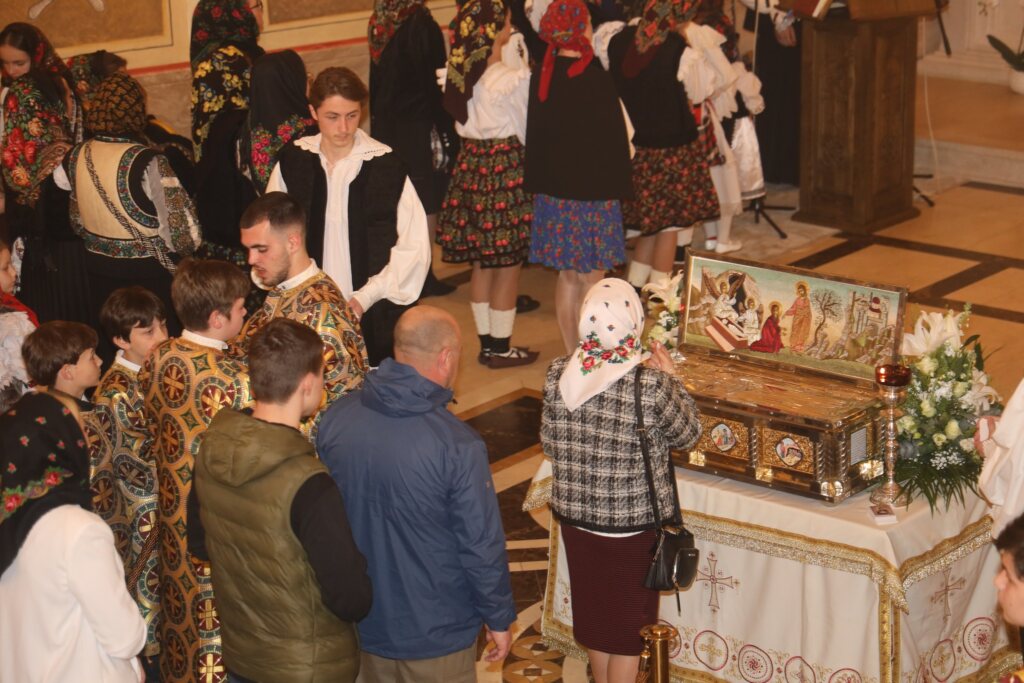Saint Pious Dimitrios the New, Protector of Bucharest, whose holy relics are kept at the Patriarchal Cathedral, is celebrated today, 27 October 2012. His Beatitude Daniel, Patriarch of the Romanian Orthodox Church and His Eminence Efrem, Metropolitan of Ydra, Spetses and Egyna celebrated the Divine Liturgy for the celebration of the saint patron of the Patriarchal Cathedral, in the presence of thousands of faithful.
Besides the Patriarch of Romania and His Eminence Efrem several hierarchs, members of the Holy Synod of the Romanian Orthodox Church, were also present.
Important state and local personalities, hundreds of priests and deacons of the Archdiocese of Bucharest attended the event, as well as thousands of faithful and pilgrims who waited patiently to pray the holy relics laid under the canopy specially arranged near the Patriarchal Cathedral. The answers at the pew were given by Nicolae Lungu chorus of the Romanian Patriarchate.
In the sermon delivered after the evangelical pericope, the Patriarch of Romania spoke to the faithful present about the life of Saint Dimitrios the New, Protector of Bucharest and of Saint Nectarie.
The Healer Saints Make Merciful Wonders
The Primate of the Romanian Orthodox Church emphasised the fact that the two great saints had the desire of holiness and of the union with the One Holy Christ as a common characteristic, as well as the gift of healing that Christ made them worthy of.
“These two great saints have the desire of holiness or union with the One Holy Christ and the fact that they were both monks as common features. At the same time, they also have the great virtue or the gift of healing people as a common feature. The healing gift is a divine gift given by Christ, our Saviour, to His Apostles and then to some of the most humble and merciful saints. The healing gift reflects God’s mercy because wonders are always made out of love for the people, never as a result of the selfish desire to show off. Any wonder of Jesus Christ, our Lord, was made out of compassion, of mercy. He felt pity for the sick, distressed, confused so that this merciful love is the love conveyed to the saints. Thus, the healer saints make merciful wonders”, His Beatitude said.
Tell your parents to take me out of the water
While presenting the life of Saint Dimitrios the New, Protector of Bucharest, His Beatitude emphasised the fact that the Saint lived in this territory in much lowliness, prayer, fasting and effort.
“Saint Pious Dimitrios the New lived in the 13th century during the time of the Romanian Bulgarian emperors Petru and Ionita Asan, an empire with Tarnovo as capital. Saint Dimitrios the New lived as a shepherd first, then he became a monk in a monastery in a cave, and lived in much lowliness, prayer and fasting. After some time, when Christ, our Lord, thought he reached full lowliness He called him to Him. Many years passed, even centuries, over his body that was lying between two boulders in a cave, till Saint Dimitrios showed himself in a dream to a girl tortured by a demon and told her Tell your parents to take me out of the water, because the water flowed into the place where the saint was covering his body with stones and water. After the girl told her parents what she saw and heard in her dream, the whole village went there and found his clean body, whitened by holiness and by the water that had flowed over it. God wanted that in 1774 his relics be brought to this Metropolitan Cathedral and remain here forever”.
Saint Nectarie was worshipped ever since his life time as a miracle worker
His Beatitude has also eulogized the personality of Saint Nectarie pointing out his humble life, as well as the healer gift that the saint was worthy of.
“Saint Nectarie lived at the end of the 19th century and first half of the 20th century. He was born on 1 October 1846, in Silivria, not far from Constantinople, in the North of Greece. In 1866, aged 20, he went to Hios island, where he became a teacher, and stayed there for seven years time. When aged 27, he went to a monastery, where he lived as a brother. Here, he prayed and lived in much lowliness and obedience. Then, when 30 years old, in 1876, he became a monk of the name of Lazar, but after a few months he was ordained a deacon and changed his name into Nectarie. Later on, he went to Alexandria where he was ordained a priest in 1886 and then archimandrite. In 1889, three years later, he became Metropolitan of Pentapole and secretary of Patriarch Sofronie of Alexandria. In 1889 he went to Egypt and became, in August 1890, first of all a preacher at a Metropolitanate, and then a professor and director of Rizario school where he spiritually formed lots of seminary students. He stayed there till 1908, when he retired. In the meantime, from 1904 – 1906, he built a monastery dedicated to the Holy Trinity, where nuns came to live. He was both a father confessor and a servant priest. This monastery that we see today in Egyna was built through the contribution of Saint Nectarie’s disciples and bedecked later on, becoming after his death a place of great pilgrimage. In fact, he was worshipped ever since his lifetime as a miracle worker because lots of faithful came to confess to him and receive his spiritual advice. Saint Nectarie healed lots of people through his prayers. He passed away in 1920, on 8 November 1920, on the feast of Saint Michael and Gabriel the Archangels. After 20 years his relics were found not rotten, and in 1953 they were moved in the church monastery; then, in 1961, he was raised to the rank of the saints in the calendar”.
Good health and disease, sufferance and healing are means by which we are deified
His Beatitude the Patriarch has also explained to the thousands of pilgrims present on the Joy Hill the fact that sometimes God allows diseases so that we should realize that we are not eternal in this world.
“Disease and healing – these two dimensions of the human life, disease and good health or good health and disease, sufferance and healing are means by which we are spiritualised, or become mature. Good health is a gift of God, just like salvation. Good health comes from God, the life giver. Yet, man is responsible for keeping and cultivating the gift of good health. Diseases often appear as a result of neglect, of carelessness, when we are not careful enough, when we do not preserve the good health gift as we should. Diseases are often allowed by God so that we should understand that we are not eternal in this world and that good health is fragile and temporary, just like life. The moment disease becomes incurable many people become desperate. But some other ones come closer to God because only so we feel we are temporary. We do wish even more to come closer and unite with the Eternal One, with God, the source of life and salvation. So, even if the disease is not healed, the soul becomes healthier through lowliness, merciful love, intense prayer, through the preparation for a Christian end, for the union with God in lowliness and strong faith”, explained His Beatitude.
Sufferance in the body often takes the soul to spiritual victory
His Beatitude Daniel, Patriarch of Romania, has also shown that the diseases are given either as a consequence of the sin or to show the work of God when healing the disease.
“The Holy Scriptures shows that sometimes the disease is the consequence of the sin. The Saviour tells the paralysed man whom He healed “See you have been made well! Do not sin any more, so that nothing worse happens to you!” Some other time, a blind born man is healed by Jesus Christ, our Saviour, and the disciples ask who sinned, he or his parents, that he was born blind. And the Saviour said that neither he nor his parents sinned, but he was born blind to show the work of God in him. In this case disease or infirmity is allowed by God to show His healing work so that the example of this sick man healed through the grace of God based on his faith and of those around him should become a light for those who forget that their good health is a gift of God and that God is the giver of the temporary life in this world and of the eternal life too”, also said His Beatitude.
The Mystery of the Holy Unction – a source of hope and joy
The Patriarch of the Romanian Orthodox Church has also shown that the intensification of the celebration of the Mystery of the Holy Unction this year made this prayer of the Church change into a source of hope and joy for the faithful in hard situations.
“Let us pray Saints Dimitrios the New and Saint Nectarie and Saints Constantine and Helen whose holy relics are here to give us good health and wisdom, peace and joy in our souls, as well as the power to pass over the troubles with more hope, with the hope that the merciful God who knows the sufferance of the people will help them directly through his saints for the glory of the Most Holy Trinity and for our salvation”, the Patriarch of Romania said in the end of his speech.
After the celebration of the Divine Liturgy, His Eminence Metropolitan Efrem delivered a speech in which he thanked His Beatitude Patriarch Daniel for the invitation to visit Romania and offered His Beatitude an icon of Saint Nectarie of Egyna as a sign of gratitude.
The Patriarch of Romania took turns in thanking His Eminence Efrem for the visit to our country as well as for having brought the holy relics of Saint Hierarch Nectarie, the healer of diseases which were laid for the pilgrims who came these days to worship them.
The Primate of the Romanian Orthodox Church offered His Eminence Efrem an icon of Saint Pious Dimitrios the New, a hierarch’s cross and an engolpion.
His Beatitude Patriarch Daniel thanked the officials present as well as all those involved in the organisation of the saint patrons’ celebration.
